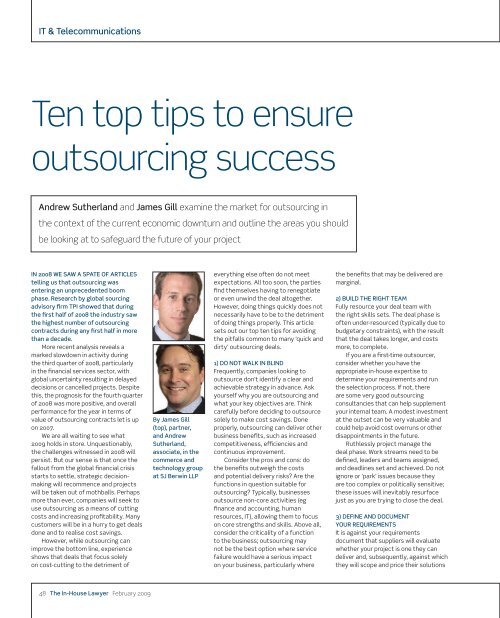Ten top tips to ensure outsourcing success - SJ Berwin
Ten top tips to ensure outsourcing success - SJ Berwin
Ten top tips to ensure outsourcing success - SJ Berwin
You also want an ePaper? Increase the reach of your titles
YUMPU automatically turns print PDFs into web optimized ePapers that Google loves.
IT & Telecommunications<br />
<strong>Ten</strong> <strong><strong>to</strong>p</strong> <strong>tips</strong> <strong>to</strong> <strong>ensure</strong><br />
<strong>outsourcing</strong> <strong>success</strong><br />
Andrew Sutherland and James Gill examine the market for <strong>outsourcing</strong> in<br />
the context of the current economic downturn and outline the areas you should<br />
be looking at <strong>to</strong> safeguard the future of your project<br />
In 2008 we SAw A SpATe of ArTIcLeS<br />
telling us that <strong>outsourcing</strong> was<br />
entering an unprecedented boom<br />
phase. research by global sourcing<br />
advisory firm TpI showed that during<br />
the first half of 2008 the industry saw<br />
the highest number of <strong>outsourcing</strong><br />
contracts during any first half in more<br />
than a decade.<br />
More recent analysis reveals a<br />
marked slowdown in activity during<br />
the third quarter of 2008, particularly<br />
in the financial services sec<strong>to</strong>r, with<br />
global uncertainty resulting in delayed<br />
decisions or cancelled projects. Despite<br />
this, the prognosis for the fourth quarter<br />
of 2008 was more positive, and overall<br />
performance for the year in terms of<br />
value of <strong>outsourcing</strong> contracts let is up<br />
on 2007.<br />
We are all waiting <strong>to</strong> see what<br />
2009 holds in s<strong>to</strong>re. Unquestionably,<br />
the challenges witnessed in 2008 will<br />
persist. But our sense is that once the<br />
fallout from the global financial crisis<br />
starts <strong>to</strong> settle, strategic decisionmaking<br />
will recommence and projects<br />
will be taken out of mothballs. Perhaps<br />
more than ever, companies will seek <strong>to</strong><br />
use <strong>outsourcing</strong> as a means of cutting<br />
costs and increasing profitability. Many<br />
cus<strong>to</strong>mers will be in a hurry <strong>to</strong> get deals<br />
done and <strong>to</strong> realise cost savings.<br />
However, while <strong>outsourcing</strong> can<br />
improve the bot<strong>to</strong>m line, experience<br />
shows that deals that focus solely<br />
on cost-cutting <strong>to</strong> the detriment of<br />
48 The In-House Lawyer February 2009<br />
By James Gill<br />
(<strong><strong>to</strong>p</strong>), partner,<br />
and Andrew<br />
Sutherland,<br />
associate, in the<br />
commerce and<br />
technology group<br />
at <strong>SJ</strong> <strong>Berwin</strong> LLp<br />
everything else often do not meet<br />
expectations. All <strong>to</strong>o soon, the parties<br />
find themselves having <strong>to</strong> renegotiate<br />
or even unwind the deal al<strong>to</strong>gether.<br />
However, doing things quickly does not<br />
necessarily have <strong>to</strong> be <strong>to</strong> the detriment<br />
of doing things properly. This article<br />
sets out our <strong><strong>to</strong>p</strong> ten <strong>tips</strong> for avoiding<br />
the pitfalls common <strong>to</strong> many ‘quick and<br />
dirty’ <strong>outsourcing</strong> deals.<br />
1) do noT wALk In BLInd<br />
Frequently, companies looking <strong>to</strong><br />
outsource don’t identify a clear and<br />
achievable strategy in advance. Ask<br />
yourself why you are <strong>outsourcing</strong> and<br />
what your key objectives are. Think<br />
carefully before deciding <strong>to</strong> outsource<br />
solely <strong>to</strong> make cost savings. Done<br />
properly, <strong>outsourcing</strong> can deliver other<br />
business benefits, such as increased<br />
competitiveness, efficiencies and<br />
continuous improvement.<br />
Consider the pros and cons: do<br />
the benefits outweigh the costs<br />
and potential delivery risks? Are the<br />
functions in question suitable for<br />
<strong>outsourcing</strong>? Typically, businesses<br />
outsource non-core activities (eg<br />
finance and accounting, human<br />
resources, IT), allowing them <strong>to</strong> focus<br />
on core strengths and skills. Above all,<br />
consider the criticality of a function<br />
<strong>to</strong> the business; <strong>outsourcing</strong> may<br />
not be the best option where service<br />
failure would have a serious impact<br />
on your business, particularly where<br />
the benefits that may be delivered are<br />
marginal.<br />
2) BuILd THe rIGHT TeAm<br />
Fully resource your deal team with<br />
the right skills sets. The deal phase is<br />
often under-resourced (typically due <strong>to</strong><br />
budgetary constraints), with the result<br />
that the deal takes longer, and costs<br />
more, <strong>to</strong> complete.<br />
If you are a first-time outsourcer,<br />
consider whether you have the<br />
appropriate in-house expertise <strong>to</strong><br />
determine your requirements and run<br />
the selection process. If not, there<br />
are some very good <strong>outsourcing</strong><br />
consultancies that can help supplement<br />
your internal team. A modest investment<br />
at the outset can be very valuable and<br />
could help avoid cost overruns or other<br />
disappointments in the future.<br />
Ruthlessly project manage the<br />
deal phase. Work streams need <strong>to</strong> be<br />
defined, leaders and teams assigned,<br />
and deadlines set and achieved. Do not<br />
ignore or ‘park’ issues because they<br />
are <strong>to</strong>o complex or politically sensitive;<br />
these issues will inevitably resurface<br />
just as you are trying <strong>to</strong> close the deal.<br />
3) defIne And documenT<br />
your requIremenTS<br />
It is against your requirements<br />
document that suppliers will evaluate<br />
whether your project is one they can<br />
deliver and, subsequently, against which<br />
they will scope and price their solutions
and delivery schedule. Encourage<br />
dialogue and Q&A opportunities with<br />
your prospective suppliers: this may<br />
help you <strong>to</strong> refine your requirements.<br />
Share the output from that dialogue<br />
and Q&A with the other bidders (which<br />
can be achieved through the use of<br />
appropriate terms in the confidentiality<br />
agreements that are typically entered<br />
in<strong>to</strong> <strong>to</strong> cover discussions during the<br />
bid phase). The more detailed and<br />
comprehensive your requirements are,<br />
the less likely it is that there will be<br />
misunderstanding or ambiguity between<br />
you and the supplier. In turn, this will<br />
help <strong>to</strong> mitigate the risk of scope creep<br />
and associated management headaches<br />
further down the track.<br />
4) cHooSInG your SuppLIer<br />
Whichever procurement process you<br />
adopt (and you should strive <strong>to</strong> run<br />
a credible competition), you need<br />
<strong>to</strong> determine up front your detailed<br />
evaluation criteria. Price should<br />
not be the only (or even the most<br />
important) fac<strong>to</strong>r in your evaluation.<br />
Our experience shows that selecting<br />
the cheapest supplier often ends up<br />
costing more in the long run. Equally<br />
valid considerations are:<br />
n The proposed solution and time<br />
frames: does it meet your stated<br />
requirements?<br />
n Approach <strong>to</strong> transition and start-up.<br />
n Experience and references.<br />
n Cultural fit.<br />
n Innovation.<br />
n Scalability.<br />
n Geographic footprint.<br />
n Flexibility and agility: how will your<br />
supplier adapt <strong>to</strong> change?<br />
n Response <strong>to</strong> key commercial<br />
principles and contract terms<br />
and conditions.<br />
5) neGoTIATe A ‘wIn-wIn’ deAL<br />
Avoid adversarial negotiations in<br />
the contracting phase. Your first<br />
engagements with the supplier will set<br />
the standard for things <strong>to</strong> come. You<br />
are not buying widgets, but complex<br />
services, on complicated commercial<br />
terms from sophisticated suppliers, so<br />
the traditional procurement approach<br />
of beating up your suppliers is unlikely<br />
<strong>to</strong> achieve the right results.<br />
Aim <strong>to</strong> achieve a win-win deal:<br />
namely, sensible commercial terms,<br />
with a fair apportionment of risk<br />
between you and your supplier. Do not<br />
expect <strong>to</strong> offload 100% of the risk; even<br />
if you manage <strong>to</strong> do so contractually,<br />
your supplier may still not really<br />
understand the delivery risks and hence<br />
how <strong>to</strong> manage them, which will mean<br />
both parties end up being out of pocket<br />
in the long run.<br />
Allow your supplier <strong>to</strong> make a<br />
reasonable profit. Forcing your supplier<br />
<strong>to</strong> accept bargain-basement pricing<br />
may look great on paper, but could<br />
also mean that you are s<strong>to</strong>ring up real<br />
problems for the future. A supplier<br />
cannot live with an unprofitable deal<br />
forever, and, <strong>to</strong> improve their margins,<br />
they may be forced <strong>to</strong> slash costs<br />
on the project in a way that impacts<br />
quality and delivery. Other tactics may<br />
include aggressively managing change<br />
<strong>to</strong> the project <strong>to</strong> improve margins, or<br />
even wholesale renegotiation. Recent<br />
high-profile examples, such as the<br />
departure of Accenture and Fujitsu<br />
from the UK NHS Connecting for Health<br />
National Programme for IT, show that<br />
suppliers are not shy about walking<br />
away from unprofitable deals mid-term.<br />
Tough, cus<strong>to</strong>mer-friendly contracts and<br />
threats <strong>to</strong> take legal action might bring<br />
monetary redress, but in the meantime<br />
irreparable damage might have been<br />
done <strong>to</strong> your business.<br />
6) muLTI-SourcInG<br />
Consider multi-sourcing (contracting<br />
with two or more suppliers, as opposed<br />
<strong>to</strong> a single supplier). This can achieve a<br />
number of benefits, including securing<br />
‘best fit’ for your services and reducing<br />
delivery risk by not being over-dependent<br />
on one supplier.<br />
However, you should recognise,<br />
and address, the new risks that multisourcing<br />
creates. First amongst these<br />
is integration risk arising from the fact<br />
that no single supplier has end-<strong>to</strong>-end<br />
delivery responsibility, meaning that<br />
it may become difficult <strong>to</strong> attribute<br />
responsibility for any failure, with the<br />
net effect being that the cus<strong>to</strong>mer<br />
retains that risk. This can be addressed<br />
by requiring one of your suppliers <strong>to</strong><br />
take the operational integra<strong>to</strong>r role<br />
and requiring all suppliers <strong>to</strong> sign up<br />
<strong>to</strong> interface agreements designed <strong>to</strong><br />
<strong>ensure</strong> co-operation between them.<br />
Inevitably, in addition <strong>to</strong> the integration<br />
risk premiums that suppliers will fac<strong>to</strong>r<br />
in<strong>to</strong> their pricing, multi-sourcing will<br />
result in additional management and<br />
governance burdens on you. This<br />
may mean that multi-sourcing is only<br />
viable for the larger deals where the<br />
costs savings are significant enough<br />
<strong>to</strong> offset the risks.<br />
7) offSHorInG<br />
Offshoring the provision of business<br />
functions <strong>to</strong> low-cost, overseas<br />
locations is often seen as synonymous<br />
with <strong>outsourcing</strong> and will very likely be<br />
integral <strong>to</strong> the delivery model of some<br />
of your prospective suppliers. However,<br />
the decision <strong>to</strong> offshore should not be<br />
taken lightly.<br />
Ask yourself whether it is<br />
appropriate <strong>to</strong> offshore the function<br />
in question, particularly where it is<br />
cus<strong>to</strong>mer-facing; for example, with call<br />
centres. Businesses that don’t ask<br />
this question often end up bringing<br />
IT & Telecommunications<br />
‘Recent high-profile examples, such as<br />
the departure of Accenture and Fujitsu<br />
from the UK NHS Connecting for Health<br />
National Programme for IT, show that<br />
suppliers are not shy about walking<br />
away from unprofitable deals mid-term.’<br />
February 2009 The In-House Lawyer 49<br />
>
IT & Telecommunications<br />
the work back in-house, by which time<br />
cus<strong>to</strong>mer goodwill may have been<br />
irreparably damaged and business lost.<br />
Identify the most commercially viable<br />
location. Whereas a few years ago India<br />
was the location of choice, nowadays,<br />
with challenges arising from costs<br />
pressures, poor infrastructure and lack<br />
of available quality talent, cus<strong>to</strong>mers<br />
are increasingly looking <strong>to</strong> offshore <strong>to</strong><br />
countries such as China, the Philippines,<br />
Brazil, Vietnam, South Africa and Eastern<br />
Europe. The need for physical proximity<br />
may mean that offshoring <strong>to</strong> the other<br />
side of the world is not an option. Equally,<br />
you should consider the implications of<br />
any time differences.<br />
Take advice, particularly on local<br />
legal, regula<strong>to</strong>ry and accounting<br />
issues. It is vital <strong>to</strong> understand local<br />
tax regimes, intellectual property laws,<br />
the local corporate and regula<strong>to</strong>ry<br />
requirements, the impact of EU data<br />
protection rules and local manda<strong>to</strong>ry<br />
laws (eg around employment terms and<br />
protections and commercial contracts<br />
laws). For regulated businesses, such<br />
as banks and insurers, any particular<br />
regula<strong>to</strong>ry requirements imposed by<br />
home state regula<strong>to</strong>rs (eg The Markets<br />
in Financial Instruments Directive<br />
(2004/39/EC) and the Financial Services<br />
Authority’s general requirements for<br />
<strong>outsourcing</strong> set out in Chapter 8 of its<br />
Senior Management Arrangements,<br />
Systems and Controls sourcebook (SYSC<br />
8)) must be considered. Any of these can<br />
impact the commercial viability of an<br />
offshoring strategy. Similarly, delivery<br />
risks arising from the choice of location<br />
should be considered and measures<br />
taken. The risk of environmental<br />
disasters, military action and political<br />
unrest can be greater in potential<br />
offshoring locations, so you must <strong>ensure</strong><br />
that adequate business continuity<br />
arrangements are put in place, including<br />
having back-up sites <strong>to</strong> which service<br />
delivery can shift in an emergency.<br />
8) AcTIve GovernAnce<br />
Effective governance and strong<br />
relationships are key <strong>to</strong> any <strong>outsourcing</strong><br />
relationship. To achieve this, you need<br />
<strong>to</strong> <strong>ensure</strong> that you actively manage<br />
the relationship. This calls for constant<br />
communication. You may choose <strong>to</strong><br />
establish a hierarchy of management<br />
50 The In-House Lawyer February 2009<br />
forums, which would address issues<br />
ranging from the achievement of<br />
strategic business objectives down <strong>to</strong><br />
day-<strong>to</strong>-day contract and operational<br />
management issues.<br />
9) STAndArdS, ServIce LeveLS<br />
And vALue for money<br />
Your <strong>outsourcing</strong> contract should detail<br />
appropriate performance measures.<br />
Consider what you need <strong>to</strong> measure and<br />
the standards that need <strong>to</strong> be achieved,<br />
but recognise that supplier performance<br />
will not (nor is it intended <strong>to</strong>) be perfect.<br />
It would be disproportionately expensive<br />
<strong>to</strong> seek <strong>to</strong> buy a bullet-proof solution.<br />
Consider the services that you are<br />
<strong>outsourcing</strong> and tailor your performance<br />
requirements accordingly. For example,<br />
service levels work well for input-driven<br />
IT <strong>outsourcing</strong>, but for business process<br />
<strong>outsourcing</strong> (BPO) <strong>success</strong> is about<br />
the improvements in the performance<br />
of your business achieved through<br />
supplier performance, not good supplier<br />
performance of itself. Therefore, for<br />
BPO, identify the strategic business<br />
objectives for the project and how best<br />
<strong>to</strong> measure their achievement. Also,<br />
consider how your supplier may be<br />
‘incentivised’ <strong>to</strong> <strong>ensure</strong> that standards<br />
are met. Poor performance may result<br />
in service charges deductions, but also<br />
implementing a bonus payment structure<br />
can help achieve over-performance.<br />
Various contractual mechanisms<br />
exist <strong>to</strong> <strong>ensure</strong> ongoing value for<br />
money. Some are more useful than<br />
others. Benchmarking is perhaps the<br />
most common example and involves<br />
the comparison of your supplier’s prices<br />
and service levels with those offered<br />
by other suppliers for the provision of<br />
comparable services. This process has<br />
its challenges, not least the struggle <strong>to</strong><br />
find meaningful comparison data, but<br />
a wealth of benchmarking expertise<br />
exists, and, if carried out constructively,<br />
in a positive manner and with the right<br />
assistance, it can be beneficial for both<br />
parties. For the supplier, it can be a<br />
ringing endorsement that it remains<br />
competitive, which is good for the<br />
relationship and for the cus<strong>to</strong>mer.<br />
When coupled with appropriate<br />
contractual mechanisms, it can be the<br />
route <strong>to</strong> lower prices and improved<br />
performance standards.<br />
10) fLexIBILITy And exIT<br />
Inevitably, your business strategies<br />
and service requirements will evolve<br />
over the life of the contract. Equally, in<br />
highly acquisitive industries, you may<br />
need <strong>to</strong> move companies or businesses<br />
in and out of scope relatively frequently.<br />
Either of these may trigger the need<br />
<strong>to</strong> restructure projects and, in order <strong>to</strong><br />
avoid the pain of deal restructuring, the<br />
contract should provide for flexibility,<br />
particularly for longer term deals,<br />
including the ability <strong>to</strong> de-scope and add<br />
<strong>to</strong> the services quickly and smoothly.<br />
Suppliers will naturally be reluctant <strong>to</strong><br />
provide undue flexibility, particularly<br />
where this might lead <strong>to</strong> less revenue,<br />
without securing appropriate<br />
protections, such as termination<br />
compensation for stranded costs.<br />
In addition, the contract should<br />
include a robust exit management<br />
regime, which secures the co-operation<br />
and assistance of your supplier on the<br />
hand-back of services or the transfer of<br />
services <strong>to</strong> a new supplier. Be alert <strong>to</strong> the<br />
fact that your supplier may be nervous<br />
about allowing you or any new provider<br />
the right <strong>to</strong> access or use trade secrets,<br />
software or other proprietary rights,<br />
even as part of a migration process.<br />
Taking the time <strong>to</strong> agree the supplier’s<br />
exit obligations up front is a worthwhile<br />
investment and doing so at the outset,<br />
when you have most leverage, is likely <strong>to</strong><br />
be substantially less difficult than doing<br />
so at the point when you actually need<br />
<strong>to</strong> deploy such mechanisms.<br />
concLuSIon<br />
The state of the global economy will<br />
continue <strong>to</strong> sharpen the focus on<br />
cost-cutting strategies, driving<br />
growth in new <strong>outsourcing</strong> deals and<br />
increased pressure on existing deals as<br />
cus<strong>to</strong>mers seek <strong>to</strong> extract further value.<br />
Although cus<strong>to</strong>mers and their advisers<br />
will undoubtedly need <strong>to</strong> finesse<br />
contractual models <strong>to</strong> accommodate<br />
new demands, fundamentally, the<br />
considerations addressed in this article<br />
hold true whatever your motivation<br />
for <strong>outsourcing</strong>, and observing these<br />
<strong><strong>to</strong>p</strong> ten <strong>tips</strong> should help you <strong>ensure</strong> the<br />
<strong>success</strong>ful delivery of your project.<br />
E-mail: james.gill@sjberwin.com;<br />
andrew.sutherland@sjberwin.com.













